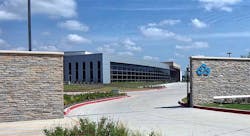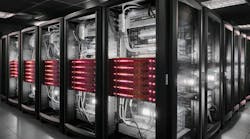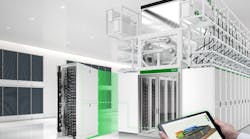Energized In Texas: Skybox Targets Dallas, Adds Colo Services
PLANO, Texas – Sometimes a penny saved is only a penny. When it’s a penny on the rate your data center pays on its energy bill, it can add up to millions of dollars.
Skybox Datacenters is focused on strategies that offer tenants this kind of repeatable savings on the cost to build and operate their facilities. Tax abatements, pass-through power and demand response aren’t always the makings of sexy headlines. But in a data center project, their impact on the bottom line can be huge.
That’s the philosophy guiding the company’s Skybox Legacy One data center development in Plano, a northern suburb of Dallas. The company has completed work on a 150,000 square foot, 25-megawatt facility that represents the first phase of the 21-acre project within Legacy, a 2,500 acre business park in Plano created by Ross Perot.
The Skybox Dallas site features powered shell space with access to power and fiber connectivity. Skybox offers a “bring your own power” option through a concept known as ESID (short for electrical service identifier) that allows customers to leverage their own corporate buying power with electric utilities, rather than buying it through the data center operator.
“What it allows is for large multi-megawatt customers to procure their own power,” said Rob Morris, Managing Partner for Skybox. “In terms of buying power, even REITs wouldn’t have the buying power and rates of one of the Fortune 10 companies.”
With its Plano project, Skybox joins the competition in an active market for wholesale data centers in the northern suburbs of Dallas, where CyrusOne, RagingWire, Aligned, Digital Realty and RagingWire all have new projects.
Expanding Into Colocation
Skybox focuses on purpose-built facilities and operates in the wholesale market, handling both speculative and build-to-suit projects. Its first project was a 90,000 square foot data center in Houston’s “Energy Corridor,” where it saw an opportunity to build a wholesale business catering to high-density customers from the oil and gas industry. Skybox optimized its offering for multi-megawatt customers who want a private data center.
Skybox is a joint venture between Rugen Street Capital and Bandera Ventures, it is led by Morris, who previously was U.S. practice leader for Cassidy Turley’s data center solutions group, and Bandera Ventures executive Tom Leiser.
The expansion into Dallas is just one element of the growth story at Skybox, which specializes in wholesale data centers but recently added colocation services at its Houston Data Center.
The entry into colocation is also all about energy – in this case, the cluster of oil and gas companies housed at the Skybox Houston campus. One of the data halls within the Houston facility will be dedicated to colo services.
“We’ve had a lot of additional demand in Houston, because a lot of the oil and gas companies are turning to a hybrid cloud solution,” said Morris. The service builds on a partnership with Triton Data Services, which specializes in cloud solutions for geophysical data services, which help oil and gas companies determine the best places to drill wells. These services require seismic mapping that is compute-intensive, and often requires low latency connections between compute clusters and databases.
Triton is a tenant, and the Skybox colocation data hall provides space for energy companies to house their compute and storage in close proximity to one another.
“Triton and its data center at Skybox Houston creates one of the first hybrid cloud and colocation options for oil and gas companies in Houston,” said Morris. “Houston is unique because not a lot of the cloud guys have a presence here.”
Aftermath of Harvey
Houston is also unique for having survived Hurricane Harvey, which the National Hurricane Center said this week was “the most significant tropical cyclone rainfall event in U.S. history,” with more than 60 inches of rain falling in some locations. Houston’s major commercial data centers remained online during the storm.
But corporate on-premises IT facilities didn’t fare as well during Harvey, which damaged 300,000 buildings in Greater Houston. Some of those companies have turned to Skybox and other service providers for help.
“After the storm, our facility did very well,” said Morris. “There were a lot of enterprise facilities that went down, most of them inside office campuses or not in a purpose-built facility. There were some multi-story facilities that had leaks on thire roof that affected their data centers. The operators did very well. It just shows what it means to make the data center the number one priority in your business.”
At one point in late 2017, Skybox had 11 different customer installations underway from corporate tenants relocating from on-premises facilities.
Big in Dallas
Further north in Dallas, the local data center market is spreading out, with recent development focusing on northern suburbs like Plano, Garland and Allen.
Skybox has enough land at its Legacy One campus to support up to five data centers. The company expects to benefit from its presence in the Legacy business park, which houses 25 million square feet of office and retail space for companies like J.P. Morgan, JC Penney, FedEx, Capital One and Boeing.
The Skybox Houston One data center, where the company recently began offering colocation services as well as wholesale space. (Image: Skybox)
Legacy is “where Dallas enterprise money is being spent,” said Gordon Kellerman, VicePresident of Leasing and Marketing for Skybox.
The site is fed by two substations, and the data center is equipped with a 6-inch concrete roof that can sustain winds of up to 190 MPH. The building has multiple data halls that can be configured in a range of power resiliency (2N, N+1 and N).
“N+1 and N customers go to that because of the savings,” said Morris. “There’s a lot of unique ways to augment power procurement that can save millions of dollars. It can be a 20 to 30 percent overall savings if you structure your power savings differently.”
Customers that choose the Direct ESID option get their own power meter and easements to control utility access via the equipment yard. Legacy One tenants can get additional savings through demand response programs that Skybox offers through partners like MP2Energy, which offer power management and on-site generation programs that can save money.
“To be able to get a penny savings is huge,” said Kellerman.
And for further coverage, check out Data Center Frontier’s page dedicated to the Dallas Data Center Market, that will provide the latest stats and info on this quickly growing area that is continuing to experience a data center boom.
About the Author



